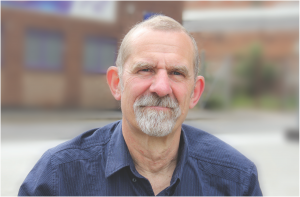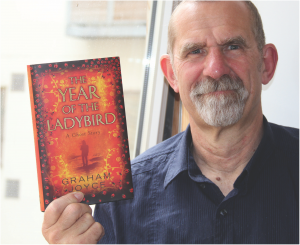LEICESTERSHIRE-BASED AUTHOR GRAHAM JOYCE SITS DOWN WITH PUKAAR MAGAZINE’S JAMIE ROBERTS TO TALK WRITING, LIVING ON A GREEK ISLAND AND HIS LATEST NOVEL
 Author of fifteen novels and numerous short stories, Graham Joyce has been writing since 1988 when, having grown tired of his job working for the National Youth Organisation in Leicester, he decided he needed a change of career. Along with his now wife, the two upped sticks and moved to a Greek island for a year so that he could dedicate his time to perfecting his craft. The modest house and primitive surroundings allowed Graham to, as he says, “crank out an incredible amount of words on a daily basis.” This experience taught him how to push words around a page, improving his writing skills.
Author of fifteen novels and numerous short stories, Graham Joyce has been writing since 1988 when, having grown tired of his job working for the National Youth Organisation in Leicester, he decided he needed a change of career. Along with his now wife, the two upped sticks and moved to a Greek island for a year so that he could dedicate his time to perfecting his craft. The modest house and primitive surroundings allowed Graham to, as he says, “crank out an incredible amount of words on a daily basis.” This experience taught him how to push words around a page, improving his writing skills.
A lot is owed to that year spent on the island, away from the hectic schedule of modern life, and Mr Joyce said “There was no internet, no TV, no cinema, nothing to distract me from writing except visits from friends who came for a couple of weeks to have the experience. The fairy tale ending to that year is that I got my first novel, Dreamside, published. So that’s where I started.”
The Midlands author, whose book Some Kind of Fairy Tale won the British Fantasy Award for Best Novel, published his latest text The Year of the Ladybird last year. Loosely based upon personal experiences of his time spent at a holiday camp in 1976, it follows a student called Daniel who decides, against his parents’ wishes, to work at a summer camp in Skegness. Things begin to take a turn when David starts hallucinating and seeing images of his late father.
Commenting on that summer, the author said: “It was a heat wave and we had a hose pipe ban everywhere; the country was suffering in drought and there was a plague of ladybirds on the coast.”
As a young man during that period he was courted by National Front members who were trying to recruit students, and this comes across in the novel. Graham noted that “It’s actually a ghost story but it also has all of that underlying political and heat wave context. So it was based on experience.”
His stories tend to revolve around places in the Midlands, specifically Leicestershire, and Mr. Joyce thinks that “Because I’ve set a lot of the books in the East Midlands it means I have quite a a lot of readers in the area and I think they appreciate that the settings are in the world that they know.” It is clear that he places a large significance on the use of location in his novels, saying “I think stories grow out of a place. I mean you find them in the earth, the earth breathes the stories really, it’s an odd thing but if I go somewhere new the narratives start suggesting themselves to me.”
 Many of the novels have been categorised as a mixture of fantasy, science fiction and mystery, and The Year of the Ladybird is no different. “I like fantasy myself but my own books are not Tolkien-esque at all, they’re not anything like that really. So there is a problem that sometimes I’m missing readers who think it’s going to be a fantasy then it’s not.”
Many of the novels have been categorised as a mixture of fantasy, science fiction and mystery, and The Year of the Ladybird is no different. “I like fantasy myself but my own books are not Tolkien-esque at all, they’re not anything like that really. So there is a problem that sometimes I’m missing readers who think it’s going to be a fantasy then it’s not.”
However, the award-winning author doesn’t spend too much time worrying about losing possible readers due to pigeon-holing of his books by book stores or publishers: “There’s not much I can do about it. What I would say is that it is very big on narrative, which is good for people who like story and storytelling, and those that like the exploration of family and human relationships.”
When deciding where to go with a narrative, Graham has no shortage of ideas: “It’s like having a noisy crowd at the back of your head, and you just choose the one who’s making the biggest clamour really. You know it’s a fact of life that I’m not going to live long enough to tell all the stories that I want to tell, so I’ve got to have a think about the one that seems to have the most energy in it and go with it.”
Finally, when asked to share some advice to any budding writers in Leicestershire who may be looking to follow in the local author’s footsteps, he said: “The thing to do is to treat it just like playing a musical instrument, in the sense that you have to sit down and practise it, you can’t get anywhere with an instrument unless you do that, and it’s exactly the same with writing.”
He added that the key is to keep writing steadily daily and that at some point “You start to surprise yourself by what you can do.”



